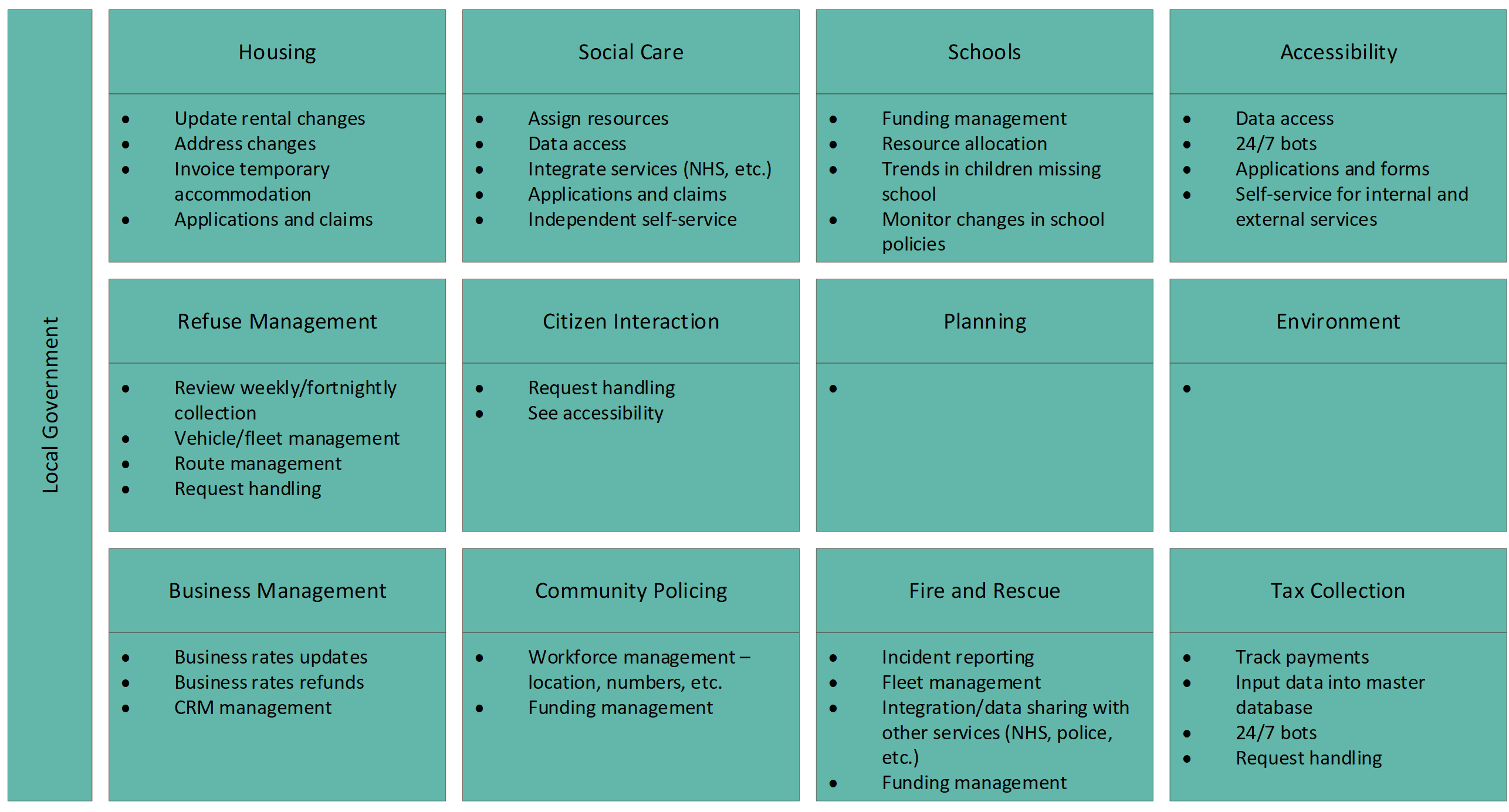
POINT OF VIEW
Automation in Local Government – Why?
How can automation in local government change the way they deliver services to residents? This point of view will be looking at how automation can increase business efficiency, reduce costs, and improve availability and access to services.
What is Robotic Process Automation?
Robotic Process Automation (RPA) uses software bots to automate business processes. RPA technology is a platform that enables you to build, deploy and manage software bots that can imitate human action by interacting with digital systems using interfaces designed for people. Actions include navigating systems; understanding what is on the screen; completing keystrokes; extracting and inserting data; and performing defined actions.
RPA bots mimic human interaction with computer interfaces to make processes more efficient.
The use of bots removes the need to spend time on routine, repetitive, data-heavy processes that impact staff workload. By removing the need to do these tasks, staff are now able to focus on the more important, productive tasks that may have been put aside for administration.
PwC estimate that 45% of work activities could be automated. This shows RPA is an opportunity to improve the accuracy and timeliness of nearly half of the business processes within an organisation, why not take advantage of RPA?
The UK Civil Service has a workforce of 5.4 million people spread across local government and the NHS. Deloitte estimate that in 2016, 1.3 million repetitive jobs (27% of the workforce) had a 77% chance of being automated. With this being nearly 5 years ago now, these numbers have likely increased as technology advances. If this is to be believed, then the potential savings and efficiency that automation could provide within local government is significant.
There are a number of general business uses of RPA that can be applied to any organisation – read here to find out more – but there are also ways in which RPA can be specifically applied to different industries and organisations.
How Do I Set Up Effective RPA?
When considering the use of automation in Local Government, we recommend identifying the business needs before trying to find where you can slot RPA in. Once the needs have been found, you can see where RPA can be utilised to configure a solution beneficial to the organisation.
To find these business needs, you can start by identifying the pains. These may be found in the strategies drawn up by the council, outlining where they think improvements need to be made. They could include improving the engagement of residents and their accessibility to services, making the collection of council taxes more efficient, or even just creating a single database that contains all the information about a resident that can be accessed when necessary.
With funding cuts from the government, the effects of coronavirus, and an increase in demand for services, local councils are facing major budget and resource constraints. This means councils need to find ways of providing the required services with minimal costs. To do this, they can’t sacrifice vital services, and short-term fixes are not going to solve the issues, therefore, another solution has to be found.
RPA can start the process of transformation without the worry of changing the existing infrastructure
RPA has the capability to be used on top of legacy technology. This can benefit any local authority that is not yet ready to commit to a full-scale digital transformation. RPA can start the process of transformation without the worry of changing the existing infrastructure.
Responsiv offer free process discovery workshops as a way to help businesses assess their existing processes and improve upon inefficiencies. Building on this, we also help identify the processes that fit the criteria for automation and run through how this would be done. To find out more, contact us today!
What is RPA used for?
With the need to go digital becoming more intensive, local councils need to catch up. Automation in local government provides the opportunity to improve resident experiences and quick access to services and data. There is a large push for local government to implement RPA. Research published on Transformation Network found that ‘nearly 85% of local authorities recognise the need to plan for RPA, with 75% having no clear sense of where to start’.
Here are a few examples of departments and processes that could be improved by implementing automation in local government:

Without going into too much detail, here are some specific applications of RPA within local government.
Take advantage of RPA and transform data and processes
With the use of RPA, councils can create master databases for the storage of all the information associated with residents and staff. This database can be accessed by bots to fill in forms/applications, sign into services, and even to share across different systems.
The use of multiple systems to store the same data increases the risk of misinformation, duplication, or even gaps in data due to it being splintered across various locations. Automation in local government can ensure that services have access to this data to create more efficient processes for staff, residents, and external services (NHS, etc.). Not only will this improve resident experiences, but it can make the process of applying for services easier for all those involved – there will no longer need to be a trail of information requests or delays in applications.
‘Tell us once’ data (where data will only need to be input once by a human) will save time and effort for the residents and staff, as well as save the council money due to the saving on resources to access and store this data.
Looking at common local government pains such as how to optimise social care, there are various ways RPA can help.
Giving residents the ability to be independent with their care is a goal shared by many local authorities. By allowing easy access to application requests or live information on their health and the services they are entitled to, is just one of the ways implementing automation in local government can improve the efficiency of service provision.
Beyond this, automation can also process applications, remove any duplicates, authorise, or decline requests, and allocate the necessary resources. This allows staff to focus on actually providing the resources and care, rather than stressing to even authorise and find the people necessary.
The 24-hour capabilities of the software bots also ensures that residents have access to services and data whenever they want without the need for staff contribution.
More benefits than expected
On top of the resident facing applications, automation in local government can help on a business level. This includes the ability to improve the financial situation of councils in various ways.
The Return on Investment (ROI) for RPA is faster than most other software, being weeks or months instead of years
The first, most obvious, is that the software itself can save local government money. The ROI for RPA is a lot faster than most other software, being weeks or months instead of years. This saving is made mainly due to the freeing up of resources to do more productive work that benefits the organisation.
The second way is that you are able to compile reports on the financial state of the whole organisation swiftly and efficiently without the need of any human intervention. Whereas reports may have been delivered 2 weeks late and out of date, they can now be delivered on time with relevant information. This will help to understand the ways in which budgets can be altered to become more cost-effective and to see where any bottlenecks may be appearing.
The third way is due to RPA being sold as a Solution as a Service (SolaaS). This means that every aspect of the solution is included in a single, fixed price – the licencing, support, installation, hosting, etc. By choosing to use a solution as a service, organisations avoid the risk of encountering further costs down the road and can easily include the costs in a budget.
What’s next?
To conclude, RPA can be used for general business optimisation in a variety of beneficial ways. In this context, the meaning of general business if the base level departments and processes required for every organisation in any industry to function. Therefore, these uses can be applied to any business.
To find out how RPA can benefit your organisation contact Responsiv.
*By pressing submit you agree to receiving communication from Responsiv. You may unsubscribe from communications at any time.

